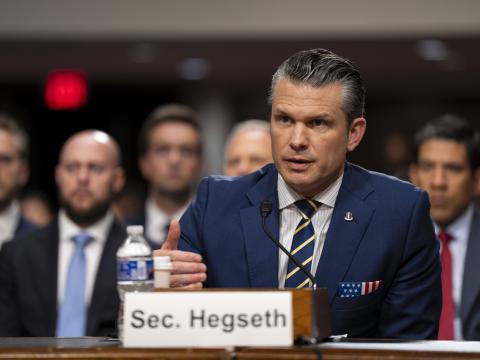New Baghdad Chapter's First Meeting Emphasizes Communications Technology
The recently formed Baghdad Chapter held its first meeting in November. Activated in September, the chapter aims to serve as a collaborative forum for Iraqi and
The chapter demonstrated this initiative during its first meeting, where it connected with AFCEA International officers Kent R. Schneider, president and chief executive officer; Lt. Gen. John A. Dubia,
Gen. Dubia notes that from the chapter’s inception, it took advantage of the available communications technology. The idea for the videoconference originated from the chapter, he says. “The chapter is using [communications technology] as an enabler to move forward—and rapidly.”
Col. Karlton Johnson, USAF, J-6, Multinational Security Transition Command—Iraq, and chapter president, notes that the Baghdad Chapter plans to use communications technology in addition to traditional chapter communications such as in-person meetings. He explains that because traveling by air or ground convoys takes a significant amount of time, in-person chapter meetings are not always feasible. Technologies such as videoconferencing enable chapter members to attend meetings in real time and avoid traveling.
“By nature of being here with the meeting constraints induced by the environment, you take advantage of what you’ve got,” the colonel shares. “Back home, we might take web cams for granted. But here, it is all new territory worthy of exploration. Using video teleconferencing systems or Adobe Connect sessions is a viable alternative for meeting here in theater. We can still get the essence of the meeting by exchanging information virtually while decreasing the risks of travel.”
Col. Johnson also emphasizes some of the chapter’s primary goals: to embrace technology wherever possible and to demonstrate to the Iraqi Security Forces the capabilities of communications and information technologies. “Communications technology is a critical enabler for Iraqi self-sufficiency,” he says.
“Most Iraqis are not used to telepresence, so this will be a new concept. Combining [in-person meetings and communications technologies] allows us to achieve our objectives of building lasting relations and introducing a variety of technologies to the Iraqi people … Using telepresence as part of our [chapter meeting] options expands their understanding of this,” the colonel explains.
Gen. Dubia also stresses the importance technology plays within the chapter. “It shows how much [technology] is a part of the training and how the Iraqis want to take advantage of Western technology.”
He notes that Iraqi and U.S. chapter members can “get to know each other better” through the chapter, further strengthening their partnership, and that the participation of Sa’ad Allawi, director of command and control systems for the Iraqi Ministry of Defense, as a chapter member illustrates the Iraqi Security Forces’ commitment to “moving the Ministry of Defense forward through the use of technology.”
The chapter intends to broaden its use of communications technologies to offer more ways for its members to attend chapter events and connect with other members. In addition to telepresence capabilities and software such as Adobe Acrobat Connect Pro, the chapter intends to explore Web-based technologies, including blogs and wikis, through software such as Microsoft SharePoint products.
Also in development are plans for the chapter to sponsor its first TechNet exhibition within the coming year.
Interested in learning more? Check out the January issue of SIGNAL Magazine, in the mail to AFCEA members and subscribers January 2, 2009. For more information about purchasing this issue, joining AFCEA or subscribing to SIGNAL, contact AFCEA Member Services.
Visit Member Service's Region and Chapter Information page to read about other noteworthy chapter events.




Comments